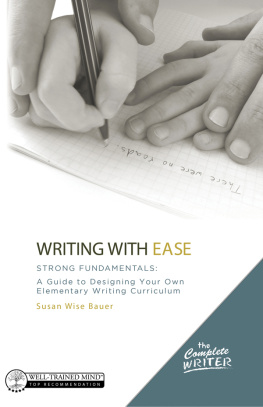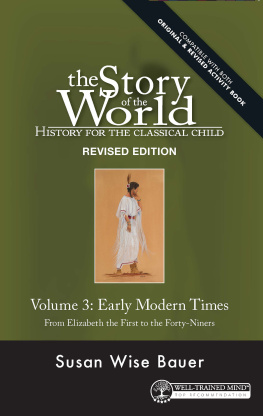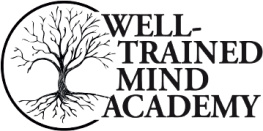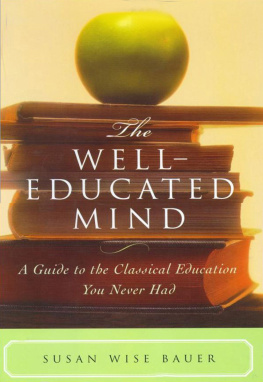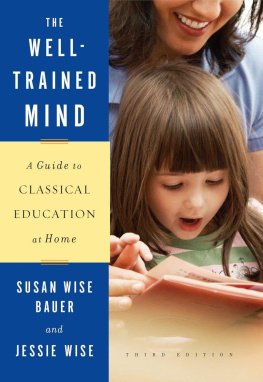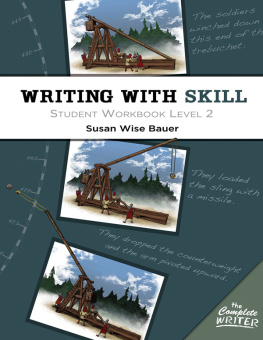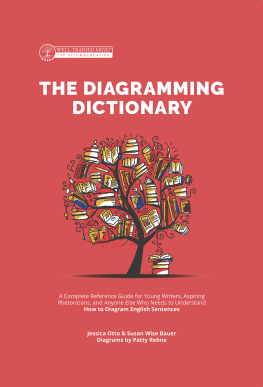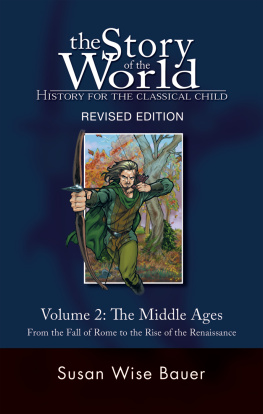Susan Wise Bauer - Writing with Ease
Here you can read online Susan Wise Bauer - Writing with Ease full text of the book (entire story) in english for free. Download pdf and epub, get meaning, cover and reviews about this ebook. year: 2015, publisher: The Well-Trained Mind Press, genre: Children. Description of the work, (preface) as well as reviews are available. Best literature library LitArk.com created for fans of good reading and offers a wide selection of genres:
Romance novel
Science fiction
Adventure
Detective
Science
History
Home and family
Prose
Art
Politics
Computer
Non-fiction
Religion
Business
Children
Humor
Choose a favorite category and find really read worthwhile books. Enjoy immersion in the world of imagination, feel the emotions of the characters or learn something new for yourself, make an fascinating discovery.
- Book:Writing with Ease
- Author:
- Publisher:The Well-Trained Mind Press
- Genre:
- Year:2015
- Rating:4 / 5
- Favourites:Add to favourites
- Your mark:
- 80
- 1
- 2
- 3
- 4
- 5
Writing with Ease: summary, description and annotation
We offer to read an annotation, description, summary or preface (depends on what the author of the book "Writing with Ease" wrote himself). If you haven't found the necessary information about the book — write in the comments, we will try to find it.
Writing with Ease — read online for free the complete book (whole text) full work
Below is the text of the book, divided by pages. System saving the place of the last page read, allows you to conveniently read the book "Writing with Ease" online for free, without having to search again every time where you left off. Put a bookmark, and you can go to the page where you finished reading at any time.
Font size:
Interval:
Bookmark:

THE COMPLETE WRITER:
WRITING WITH EASE
Strong Fundamentals
revised edition
A Guide to Designing Your Own
Elementary Writing Curriculum
by
Susan Wise Bauer

Contents






To download a workshop presentation of this essay, visit peacehillpress.com/audio-lectures.
W hen I first began teaching literature and writing at the College of William and Mary in Virginia, over fifteen years ago, my freshmen werent exactly polished writers. Out of every class of thirty freshmen students, four or five would turn in grammatically correct, coherent, clean papers. Of those, perhaps two would show a real grasp of persuasive writing.
Fifteen years later, even that percentage has dropped. I read through scores of incoherent, fragmented, unpunctuated papers, written by students who graduated from well-funded high schools with small classrooms and qualified teachers.
What are those students being taught before they get to me?
Its not that they dont write. In fact, in an effort to solve the problem of poor writing skills, schools are giving longer and more complex assignments to younger and younger children. The theory is that the more writing children do, the better theyll get at it; as one proponent of it recently told me, Give the children high-interest assignments and have them write, write, write and revise, revise, revise. First and second graders are told to write journal entries; third and fourth graders are assigned book reports and essays. Fifth and sixth graders are given research papers.
Meanwhile, writing skills continue to decline. And for the last fifteen years, at education conferences all across the country, I have heard the same refrain from the parents of these children: My child hates to write.
Theres a central problem with the write-more-and-youll-get-better method. It treats writing as though it were analogous to speech: the more deeply youre immersed in it, the more competent youll become.
But writing is essentially unlike speaking . Children have an instinctual, inborn desire to speak. Any child who is developing normally will learn to speak if spoken to. The more a child talks, the better her verbal skills become.
Children dont have that same innate drive to write. Some children scribble as soon as they can hold a pencil, but the majority dont. Even children who are taught to read and are surrounded by written language do not necessarily learn how to writebecause speech and writing are fundamentally different.
Writing, unlike speech, isnt a natural activity. Mankind survived for a very long time without finding it necessary to put anything down on paper. Until the nineteenth century (which is quite late, in the larger scheme of things) even the biggest empires chugged along perfectly well with shockingly low literacy rates. Administrators and bureaucrats had to be able to read and write, but the masses functioned quite well without paper and pencil. If theyd been unable to talk, on the other hand, their country would have fallen apart.
Written language is an unnatural foreign language, an artificially constructed code. Compare written dialogue with any transcript of an actual conversation, and youll see that written language has entirely different conventions, rules, and structures than spoken language. The rules of this foreign language must be learned by the beginning writerand they have to become second nature before the beginning writer can use written language to express ideas.
This is why so many young writers panic, freeze, weep, or announce that they hate to write. Try to put yourself in the position of the beginning writing student: Imagine that youve had a year or so of conversational French, taught in a traditional way out of a textbook, with practice in speaking twice a week or so. After that first year, your teacher asks you to explain the problem of evil in French. Youre likely to experience brain freeze: a complete panic, a frantic scramble for words, a halting and incoherent attempt to express complicated ideas in a medium which is unfamiliar. Even another year or two of study wont make this kind of self-expression possible. Rather, the conventions of the French language need to become second nature, automaticinvisible to youso that you can concentrate on the ideas, rather than on the medium used to express them.
The same is true for young writers. Ask a student to express ideas in writing before she is completely fluent in the rules and conventions of written language, and shell freeze. She cant express her thoughts in writing, because shes still wrestling with the basic means of expression itself.
I have become convinced that most writing instruction is fundamentally flawed because children are never taught the most basic skill of writing, the skill on which everything rests: how to put words down on paper.
Writing is a process that involves two distinct mental steps. First, the writer puts an idea into words; then, she puts the words down on paper.

Mature writers are able to do both steps without paying much attention to the fact that their brains are actually carrying out two different operations. But for the beginning writer, even a simple writing exercise (Write down what you did this morning) requires the simultaneous performance of two new and difficult things. And so the student strugglesjust as a baby who has barely learned to walk will struggle if you simultaneously ask him to perform some other task (such as rubbing his head). All of the babys attention needs to go into moving his feet, until that action becomes automatic. If you ask him to walk and rub his head, hell probably freeze in one place, swaying back and forth uncertainlyjust like many new writers.
Young writers need time to learn the conventions of their new language. They need to become fluent in it before they can use it to express new ideas. But in most cases, students are simply immersed in this new language of writing. While immersion techniques often work for spoken foreign languages, they dont work nearly as well for writingwhich is, after all, an artificial code rather than a natural speech expression.
Occasionally, this process produces a perfectly willing and competent writerone who has a natural affinity for writing, and can intuitively grasp those parts of the process which have not been explicitly taught. But other students remain puzzled. They became frustrated and resistant, always struggling with the task of getting words on paper, never competent enough to let their ideas flow out.
Instead, the process of writing needs to be taught in an orderly, step-by-step method that will set young writers free to use their medium rather than wrestle with it.
To download a workshop presentation of this essay, visit peacehillpress.com/audio-lectures.
Next pageFont size:
Interval:
Bookmark:
Similar books «Writing with Ease»
Look at similar books to Writing with Ease. We have selected literature similar in name and meaning in the hope of providing readers with more options to find new, interesting, not yet read works.
Discussion, reviews of the book Writing with Ease and just readers' own opinions. Leave your comments, write what you think about the work, its meaning or the main characters. Specify what exactly you liked and what you didn't like, and why you think so.

